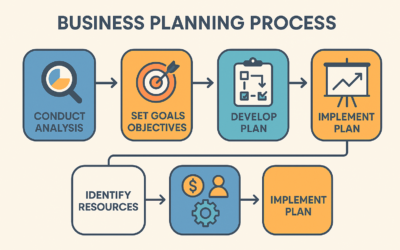Although money is not the answer to everything, it does plan an essential role for every entrepreneur.
Without it, how do you expect to run a company?
Managing finances is not an easy task. Watching where your expenses go, making sure have enough income for the month to pay bills, and everything in between, your finances can be the one aspect you don’t like about the business.
Whether you have a financial manager or are doing everything yourself, GR-US.com has a few ideas that may help make life a bit easier.
Set Yourself Financial Goals
If you don’t already, you should set yourself goals for basically everything. Goals are an excellent method to keep you on track, hold yourself accountable, and keep you in the right mindset.
Financial goals are no exception.
Write out clear and measurable goals that you can easily refer back to. Where do you want to be financial in six months, one year, or even 10 years down the road?
Learn Your Cash Intakes and Outflows
Now, this is one that can make or break a business because it comes down to this – spending more than you’re making will lead you to have no money.
Your cash intake will be all the money you earn in a month. The outflow, on the other hand, is where all your money goes when it leaves your bank account. Once you understand these two, you can make cash flow projections for upcoming months to see how you’re doing.
Cash management is critical to the success of every small business. You should build a cash management spreadsheet that allows you to predict what your cash flow will be for the next 12 weeks, which can be done by building a system that accounts for every payable and receivable within those 12 weeks. As this is updated every week, you create a rolling cash flow report that becomes a critical management tool that needs to be monitored at the beginning of each week. Cash is king for small business and knowing how to predict your cash position up to 12 weeks out will allow you to make decisions, such as calling in advance to extend a payable, to ensure that you operate your business with positive cash flow at all times.
Make a Budget
Making a budget also ties in with learning your cash intakes and outflows. A budget provides a preview of your financial situation. It’ll show you whether or not you’re in a surplus each month.
Once you’ve figured out the point above, you can put it down into a budget. Start with your average monthly earnings, as that is what you have to work with. Then, you can divide that amongst your fixed expenses (the essential ones that never change), before moving on to your variable costs.
After you have your budget filled out, it’ll show you if you have any remaining funds to work with, or if you need to cut back somewhere.
Keep Note of Taxes
It’s easy to forget that at some point, you need to pay taxes on everything you’ve earned. When you purchase something as a consumer, it’s automatically added, and you don’t have to worry about anything until tax season.
As a business owner, you need to pay attention to all the taxes you collect. It’s up to you to manually pay that amount on a monthly, quarterly, or yearly basis. Keeping track of this will not only make things easier when you have to pay, but it’ll also ensure you have enough money to actually pay taxes.
Ask for Help
Don’t let pride get in the way of your finances. When first starting, learning about your finances, cash flow, budgeting, and everything in between can get overwhelming. It’s never a bad idea to get a second opinion from a professional. Erring on the cautious side could save you a ton of money.
The above five tips are a way to get you started on managing your finances. Each situation is different, so it may take some time to figure out what works best for you.

0 Comments